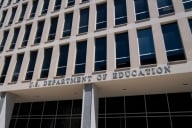You have /5 articles left.
Sign up for a free account or log in.
WASHINGTON -- Attendees gathered here for the annual meeting of the Association of International Education Administrators annual conference grappled Monday with what Susan Buck Sutton, a senior advisor for international initiatives at Bryn Mawr College, described as a “chaotic mix of beliefs that challenge the work of international educators.” Those beliefs, she said in introducing a roundtable discussion on the U.S. presidential election results, “have entered into widespread discussion and politicized in new ways the work that we do.”
The beliefs she was referring to include the blaming of globalization for the loss of jobs, outright racism and xenophobia, and the singling out of China, Mexico, and Muslim-majority nations as problematic. Other beliefs include the idea that international relations is a “zero-sum game” with winners and losers and the conviction that an “inevitable violent clash of civilizations is headed our way.” Sutton mentioned as well an antipathy toward a broad category of “elites” – a group of “strange bedfellows” as she described them, which lumps together everyone from Wall Street financiers to academics and journalists, among others – and narrow ideas of who “real,” or “true,” Americans are.
The election of Donald Trump, and the anti-globalist, “America First” sentiment he rode to victory, has presented a broad challenge to American higher education and some of its key values like internationalism and multiculturalism. That challenge became more acute after Trump signed an executive order Jan. 27 barring entry into the U.S. by refugees and nationals of seven Muslim-majority countries. Enforcement of the entry ban has since been halted by federal judges, but the Trump administration has indicated it will issue a new order -- which the president has justified on the grounds of keeping terrorists out of the U.S. -- at some point this week.
International educators in attendance for the packed roundtable discussion on Monday described a need for wider engagement with the public. At the same time, one attendee noted that universities shouldn't assume that "we don’t have significant numbers of Trump supporters in our student populations -- and what about them too?"
Other themes discussed included the impact of the election and visa policies on current international students -- an administrator reported that his students are feeling afraid -- and on future, would-be ones.
“My university, we lose our international students, it becomes an existential issue," said one attendee.
Immediately after the presidential election AIEA put out a statement encouraging “international educators to stay abreast of developments that impact international education, to advocate for policies that support the education and preparation of students to live in our interdependent society, and to engage in positive, ethical, and respectful discussion and debate with those within and beyond our campus communities as we continue to provide leadership that brings those from different backgrounds together in support of our diverse students.”
AIEA also released a statement after Trump issued his executive order barring entry by most types of visa-holders from the seven Muslim-majority countries. The order directly affected U.S. higher education institutions, some of which had students and scholars from the affected countries who were outside the U.S. at the time the order was signed and found themselves temporarily unable to return. Under the terms of the original, now halted-order, affected individuals already in the U.S. were not compelled to leave the country, but they would be unable to return if they left.
“We believe that international educators cannot be neutral in this case; we call for our colleagues to continue to advocate for the flow of people and exchange as vital to the continued advancement of knowledge and discovery, as well as greater human security and cultural understanding," AIEA said in its statement on the order.
"In this room, international educators, with ourselves and the people we work with, we have the capacity to give different frames for what global connectivity is all about,” Sutton said.
That doesn’t mean, she said, that international educators shouldn’t talk about the negative aspects of globalization. “I’m an anthropologist -- you know that I have railed against the bad aspects of globalization," she said. "But we also see the possibility for connectivity and mutual growth and benefit that are available to us through other forms of global connectivity."








